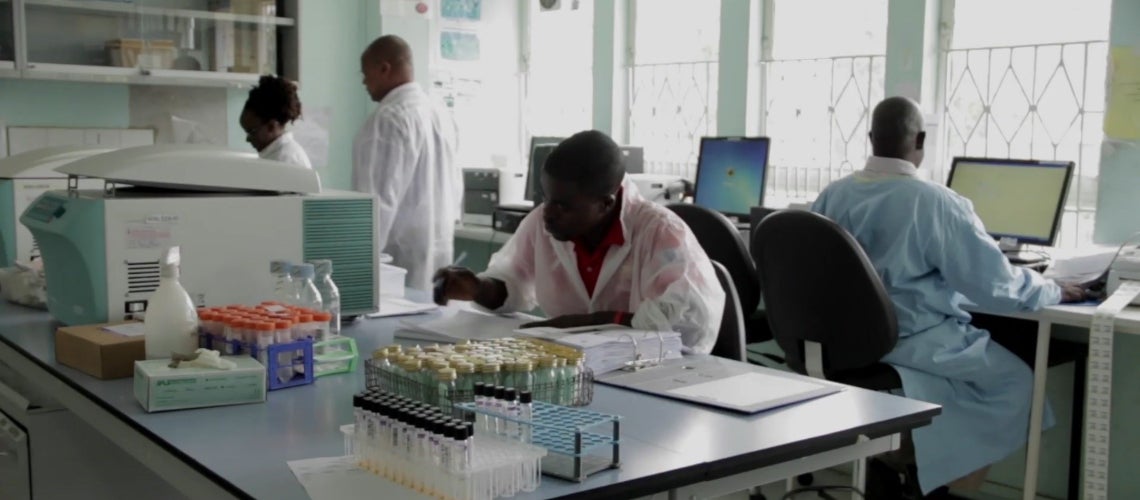 Réseau de laboratoires en Afrique de l’Est. © Banque mondiale
Réseau de laboratoires en Afrique de l’Est. © Banque mondiale
Since early reports of the coronavirus (COVID-19) in China, we’ve seen countries with robust health systems successively overwhelmed by the pandemic. Now global health experts fear the virus’ potential impact on Sub-Saharan Africa, where many countries have weaker health systems.
Wary of the devastation that it could bring, some governments including in Kenya, Nigeria, and South Africa acted early and quickly, implementing travel bans, closing schools, banning large gatherings, and setting up testing centers. At the time of writing, a total of over 10,000 coronavirus cases have been reported across all but two African countries.
The World Bank’s Global Director for Health, Nutrition, and Population, Dr. Muhammad Ali Pate, has been at the forefront of the World Bank’s response to the coronavirus pandemic. He offers an important perspective from both his current role and his experience as a trained physician and Nigeria’s former Minister of State for Health. We asked him about Africa’s capacity for dealing with the pandemic, what the World Bank is doing to support countries, and his advice to leaders.
What is the most important thing for African decision makers and community leaders to do during the crisis?
The most important thing is to build trust, in addition to pursuing the proven public health disease control approaches. One of the things we learned from other outbreaks such as Ebola is that trust can be broken and lead to counterproductive community practices. It is ultimately people’s behavior that will contain, or not contain, the outbreak.
Policymakers have an important responsibility to communicate transparently, using all available channels to share evidence and build awareness of how the infection is transmitted. They need to engage citizens – especially religious and community leaders – who can provide guidance to their communities on virus transmission.
That link of trust between governments, community leaders, and citizens is important to preserve, to ensure that people believe and follow the advice they receive. Leaders must earn and maintain the trust of communities: they need to have the humility to recognize what they don’t know, and the humility to listen to the experts.
What is the World Bank doing to help countries respond?
In early March, the World Bank Group announced a fast-track package of support to help countries respond to the epidemic. We increased the funding to $14 billion, including $6 billion in support to countries and $8 billion in support for the private sector through IFC, the World Bank’s private sector arm.
With the pandemic’s rapid spread, we were keen to respond very rapidly, especially in developing countries with weaker health systems. So our Board fast-tracked the approval of projects in 25 countries amounting to $1.9 billion, including 10 African countries.
This first round of projects will meet critical needs first, including procurement of medical supplies and personal protective equipment for health workers, expansion of laboratory and hospital capacity, and technical advice on containment strategies to mitigate transmission.
All COVID-19 emergency projects have community engagement and risk communication components, so that they can maintain and build community and citizen trust as well as social accountability.
The specific activities are tailored to each country and include, for example, developing systems for community-based disease surveillance and multi-stakeholder engagement and addressing issues such as inclusion and health workers’ safety. Some also include community-based animal disease surveillance and early warning networks at the community level to support a robust system for emergency reporting and feedback against notifiable diseases.
This is just the first phase of World Bank assistance, recognizing that there will be needs in other sectors as countries respond to wider social and economic impacts. We are prepared to deploy up to $160 billion over the next 15 months to support COVID-19 measures that will help countries address the health consequences of the pandemic and bolster economic recovery.
Have you been encouraged by the responses from African nations so far?
This is an unfolding situation. We’ve seen in Wuhan how a strong health care system was rapidly overwhelmed, even though the Chinese authorities worked hard to contain it. But their efforts may have bought all of us some time. In Italy they have a very robust health system, and the situation is still extremely challenging.
Some countries in Africa have weaker health systems, and they may bear the brunt of this pandemic. But so far, through the African Union, the Africa Center for Disease Control (CDC), and the African Taskforce for COVID-19, countries have really seized on the delayed arrival of the virus to organize. We’ve seen Africa CDC training, laboratories delivering test kits to more than 40 countries, and countries like Ethiopia and Nigeria rapidly organizing their response plans.
Over time, as cases increase and community transmission becomes established, we’ll see how well these weak health systems will withstand it. It’s very likely that we’ll see a pandemic manifestation that varies considerably across the distinct geographies of the world. There may not be a similar impact in all regions. We’re monitoring this together with our colleagues at the WHO and the Africa CDC.
What would you say to those who believe Africa lacks expertise in responding to pandemics?
The landscape is changing in terms of the region’s capacity. This is exemplified in the capabilities of the Africa CDC and national CDCs, and in the way that countries are organizing themselves already, through mechanisms including the West African Health Organization and in the Southern region as well. This is the result of decades of effort by African countries to build national capacities, and that must be continued.
However, key gaps remain, and as I mentioned, even the more advanced economies have struggled to deal with the demand on their health care systems. The World Bank’s response is aimed at quickly expanding countries’ capacities and enabling them to contain the virus using social distancing and public health measures such as handwashing to slow the rate of transmission. This can help ensure that already weak health systems are not overwhelmed.
African countries can also be part of the solution in terms of research and development for therapeutics and vaccines. We’ve seen this recently in the Democratic Republic of Congo, where the research led by Professor Jean-Jacques Muyembe Tamfum helped develop a therapy for Ebola patients.
Do you have any final thoughts?
This pandemic requires strong action by country leaders. It also requires that the global community come together to find solutions. It’s not something that countries can tackle on their own. We must ensure, as we go through this crisis, that the fabric of global solidarity stays together, while also respecting the differences among sovereign states.
Some countries and communities may be particularly vulnerable due to migration or ongoing fragility. As diagnostics, therapeutics, and vaccines are developed, the broader global community needs to pay close attention to them. In designing national responses, we must also consider the diversity of countries and their distinct vulnerabilities. At the World Bank, our focus is to mitigate the impact on the most vulnerable countries and to do all we can to protect the poorest.


Join the Conversation